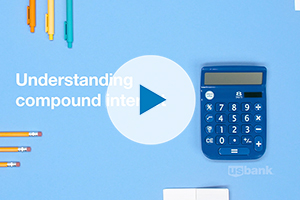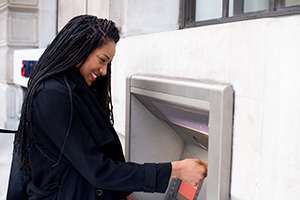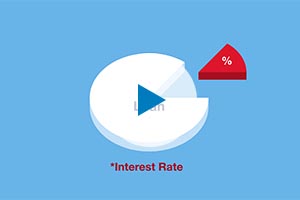Don’t let these common misconceptions stop you from healthy money management.
Sometimes our ideas about money can keep us from managing it well — even if those ideas are false. Here are some reliable savings account interest rates facts about how to grow your money.
Myth: I’ll never grow my money leaving it in a bank account
Fact: Before thinking it’s pointless to keep money in the bank, brush up on the principle of compound interest. This is when you earn interest on the money you’ve saved, as well as on the interest it has earned.
For example, if you deposit $1,000 earning a 2 percent annual percentage yield, after a month you’d earn $1.67. Then your $1,001.67 begins to earn interest. If you leave the money alone for 10 years, not adding to the principal amount, you would end up with $1,221 if you compounded the interest monthly. Continue to add to the original investment and it increases the amount of money earning interest, meaning your money grows faster.
Many traditional savings accounts offer low interest rates at the moment, but alternative accounts, such as certificates of deposit (CDs) and money market accounts, may provide higher interest rates and greater rewards than regular passport savings accounts. Before you explore those options, note: account access is limited and withdrawals may be subject to penalties.
Myth: Savings account interest rates at my bank won’t grow
Fact: Keep an eye on the Federal Reserve’s benchmark interest rate. The Federal Reserve rates influence the interest rate your bank will deliver on your savings account. When the Fed’s rate changes, your bank’s rate might change. Check your account, or ask a banker if your rate is going up. Be patient — it can take some time for a Fed action to be reflected at consumer banks.
In addition to interest rates, it’s important to also look at different features and benefits that various accounts offer, as well as fees and minimum account balances, to determine what account is best suited for you.
Myth: I’m too young to save; I don’t earn enough
Fact: The earlier you stash away funds in a savings account, the more money you can accrue through compound interest. Many tried and true tricks can help increase your savings. Even small contributions over time can add up. For example, don’t spend any coins you receive as change. At the end of the week, no matter how small the amount of change, deposit it into your savings account.
It’s a myth that young people can’t contribute to a savings account, but don’t feel pressure to do it all at once. You have plenty of time to find a strategy that works for you — making a consistent effort will ultimately get you farther on the path to security.
Myth: It doesn’t matter if I save; I’ll never feel secure
Fact: In September 2017, the Consumer Finance Protection Bureau issued a report on financial well-being based on a survey of a wide range of income earners. It showed that people who have liquid savings (money they can easily access) feel more secure than those who don’t. As the amount of savings increases, so do feelings of financial well-being. The survey also showed that people feel much more secure if they can come up with cash to cover unexpected expenses.
So, having a strategy of saving over time — and having access to funds that let you absorb unanticipated expenses — often leads to a sense of financial well-being. The most important thing is to start saving, even if the initial amount is small. Add to your savings regularly, and try not to touch the money you’ve set aside; let it earn interest for you.
Myth: Banks are risky; I’m better off stashing my cash in my mattress
Fact: Banks are one of the safest places for your money. Be sure your bank is FDIC-insured, and up to $250,000 of your deposits across all your accounts will be insured. Your money is insured through the government. The FDIC was created by Congress to boost confidence in the U.S. financial system. Putting your money in the bank no matter savings account interest rates may better protect it than leaving it in your house or even investing in the stock market.
Ready to open a U.S. Bank savings account? Explore your options.










































































































